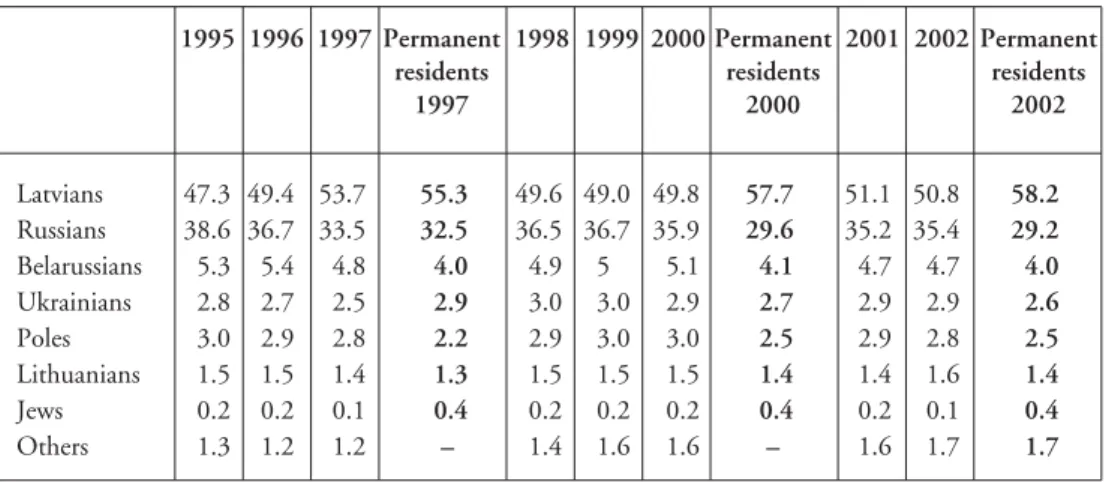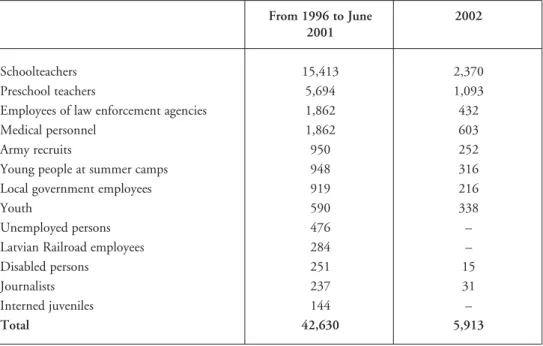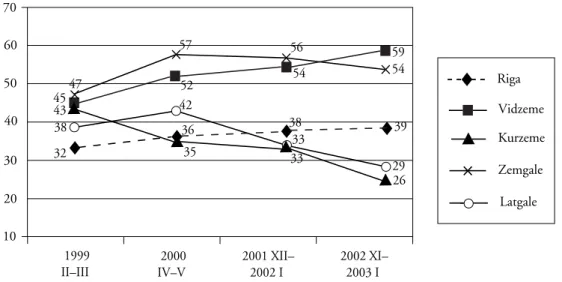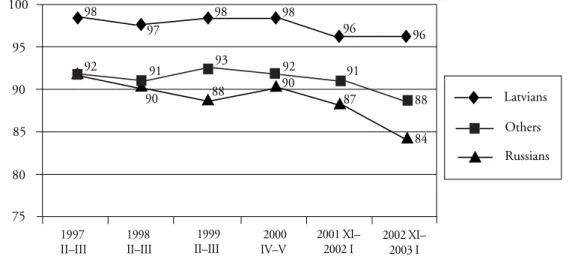Language proficiency and the integration of society in Latvia
Latvian language proficiency, training and use among ethnic minorities
At the same time, a large part of the population (60%) whose mother tongue is not Latvian has poor or no command of the language, but only 40% of those whose mother tongue is not Latvian have the Latvian language at the highest or intermediate level15 (see figure 1). About 50% of respondents who would like to improve their Latvian language skills (about 32% of the total number of people belonging to ethnic minorities) would be prepared to participate in language courses (at an average cost of about 13 lats); 33%.

Language proficiency and political integration
Reasons such as “I will not pass the Latvian language test” are mentioned by 59% of non-citizens. However, the results of the study 'Towards a civil society' also give rise to a reassessment of views on the dominant role of Latvian language skills. in the integration of society.
Language proficiency and socio-economic integration
This suggests that restrictions on the use of minority languages did not significantly contribute to the improvement of knowledge of the Latvian language or the practical use of the language55 (see chapter 2.1). Therefore, in some regions and cities with a large share of ethnic minorities, the level of knowledge of the Latvian language is lower and the use of the language is less pronounced.

Language policy in Latvia and Latvian language proficiency: the current situation
The State Language Law (1995–2000) and state language certification
The preparation of the draft law began in 1995 on the initiative of the State Language Centre, the Saeima Education, Culture and Language Committee and the Latvian Language Institute. 73 Valsts valodas politikas îstenoßana Latviå: Valsts valodas centrs Implementation of the language policy in Latvia: State Language Center 1992–2002]. The supporters of the law felt that the use of the state language by the ethnic minorities will not increase if motivation to learn the language is not provided by the law.
81 The new law makes a more pronounced distinction between the use of the state language in the public and private sectors. Attempts to increase the use of the state language in the private sphere through laws and regulations have failed and have simply increased political and ethnic tensions.
The National Program for Latvian Language Training
Analysis of Latvian language training projects has shown that the requirements of the current state language test are often considered too complicated, especially for older people. All in all, NPLLT has contributed to improving the education system as far as language training is concerned by developing a methodological basis for Latvian language training, training multipliers and preparing teaching materials.96. Although NPLLT embraces a broad spectrum of the adult population, the number of people who have attended the courses is relatively small.
NPLLT has had a wide network of partners for the development and implementation of the language policy, among them both governmental and non-governmental organizations. This is one of the reasons why NPLLT focuses on training multipliers.100.

The role of the ethnic minority education reform in Latvian language training
In accordance with the transitional arrangement of the Education Act that was adopted in 1998, the transition to bilingual education at immigrant schools for general education was initiated in the 1999/2000 school year. According to the survey, bilingual education is supported by 81% of citizens and 74% of non-citizens. Many ethnic minority organizations do not associate improving the quality of education with the reform of secondary education for ethnic minorities.
In 2003, the government's budget for the implementation of the education reform is 1,375 thousand lats (957,000 lats included in the budget of the Ministry of Education and Science plus a subsidy of 418,000 lats for NPLLT). The National Program for the Integration of Society and the activities of the Foundation for Integration.
The National Program for the Integration of Society and the activities
The final version of the National Program for Integration into Society was approved in February 2001. This institution is responsible for the implementation and coordination of the Program for Integration and Policy of National Minorities. The National Program for Integration into Society The Integration Program emphasizes that "one of the main requirements for the integration of persons of other nationalities is knowledge of the Latvian language."117 The.
The program emphasizes a consistent increase in the percentage of Latvian speakers and the acceptance of the status of the Latvian language by the ethnic minorities. Implementation of the National Program for the Integration of Society The Foundation for the Integration of Society120 is the main mechanism for the implementation of the Integration Program.
Latvian language training for naturalization candidates: the activities
The free lessons helped 78% of those who took the course to pass the Latvian language test. The draft of the Latvian language-intensive training program to promote naturalization was presented in autumn 2001. The first level program was intended for naturalization candidates with no prior knowledge of Latvian or with poor knowledge of the Latvian language.
At the beginning of 2003, the Saeima allocated 50,000 lats to the Naturalization Board for Latvian language training for naturalization candidates. Future projects for Latvian language training for naturalization candidates (and other adults) will largely depend on available government and foreign funding.
The President’s State Language Committee
The expected decrease in foreign funding when Latvia joins the EU136 means that the government's financial support for Latvian language education for naturalization candidates will become increasingly important, as well as a clear strategy for the work of various institutions involved in language education. This institution would deal with both legal issues and issues involving language training and governmental language development. According to the authors, this will only be the case when "the majority of the people living in Latvia know at least enough Latvian for elementary communication.
So far, SLC has not proposed any Latvian language training project for ethnic minorities. The SLC is actually geared towards supporting the state language while limiting the use of other languages.
Activities of the National Employment Service
Due to a lack of funds142, the Employment Service is neither able to organize language training for the majority of the unemployed who need it, nor to offer a sufficient number of lessons. For example, in Daugavpils at the end of 2001 they made up 41% of the total number of unemployed (see Box 8). Since NES is under the auspices of the Ministry of Welfare, the Ministry also coordinates Latvian language education for the unemployed.
Given the large number of people wanting to take courses and the fact that three-quarters of those who take the course can pass the language test, training opportunities for unemployed people in Latvian should be increased. Many of the unemployed previously worked in factories and were not affected by the state's language proficiency requirements until the year 1994.
Local government activities
The municipal council has set up a Society Integration Committee, which has already conducted a population survey and is working on a local integration program. According to Daugavpils Municipal Council officials, the main problem with Latvian language training is the absence of a Latvian environment. The municipal council supports the activities of debate clubs for adults, the Center for Interest Education and the Center for Children and Youth.
Improvement of Latvian language training and the Latvian environment is included in the "Human Resources" chapter of the strategy.152 Liepåja City Council's plans for the integration of society include support for youth integration camps, debating clubs, cultural associations and the organization. of twice-yearly project competitions for young people. The organizers of the courses noted that the city council's offer of language courses motivates people to learn the state language and helps to overcome alienation.
NGO role in language policy and integration of society
Here, local authorities cover about a quarter of the costs of Latvian language courses.156The Resource Center for. The experience of a number of public organizations is proof of this (see, for example, Box 9 and 11). If there is demand, the course will be adapted to the requirements of the language proficiency test (certification).
The club's main goal is to overcome the psychological barrier to speaking Latvian. The courses encourage many participants to continue learning, for example in the language club “Daina”.
Corporate and private sector activities
This trend can be observed in the example of the Daugavpils branch of Baltijas Tranzîtbanka (see Box 12). The Daugavpils bank branch also covers the costs (fully or partially) of language training of employees in private language courses. Management admits that “employees' Latvian language skills could be better, although proficiency levels meet certification requirements.
This branch of the bank carries out its own accounting, which is not done by other companies in Daugavpils. The Latvian language skills of Oeg (department head, about 30 years old) have been influenced by working with customers: 50% of the customers are Latvians.
Conclusions
Data obtained from studies carried out over a longer period of time make it possible to conclude that legislation regulating language use has neither promoted a significant increase in the use of the state language in recent years nor the motivation of ethnic minorities to learn. the state language. The place of employment is the main social environment where the use of the Latvian language is constantly increasing. 166 Concrete examples are the provision in the State Language Act that regulates the use of the state language in communication with local authorities, and language restrictions imposed on the electronic media.
The Ministry of Education and Science, the Ministry of Social Work, the Ministry of Justice and the Secretariat of the Minister for Special Tasks for Integration Affairs are also responsible for various aspects of the coordination of the process of training adults in the national language. Although changes regarding the use of the Latvian language in ethnic minority schools have helped to improve students' language skills to some extent, much remains to be done.
Recommendations
- Methods of collecting information
- Personal assessment of Latvian language proficiency
- Desire to improve Latvian language proficiency
- Language training methods that respondents would be prepared to use
- Summary of focus-group discussions with Daugavpils residents and experts
Personal assessment of knowledge of Latvian (percentage of respondents whose mother tongue is (percentage of respondents whose mother tongue is not Latvian; n=912). Desire to improve knowledge of the Latvian language (percentage of all respondents whose mother tongue (percentage of all respondents whose mother tongue) language not Latvian; n=914). Participants believed that the main reason why knowing Latvian is important is their current job or future employment opportunities. Residents believed that: "Latvian is of course also needed in Daugavpils because it means a stable income , certainty about the future in relation to employment." Or: "If you want to improve your qualifications, etc., attend e.g. courses, you encounter problems.
The experts underlined that "the media does a lot to generate a negative attitude, especially in Daugavpils". If a person is already settled in life, then the biggest problem is the state language". Residents also agreed that "the biggest problems are those between 40 and 50 years old.

